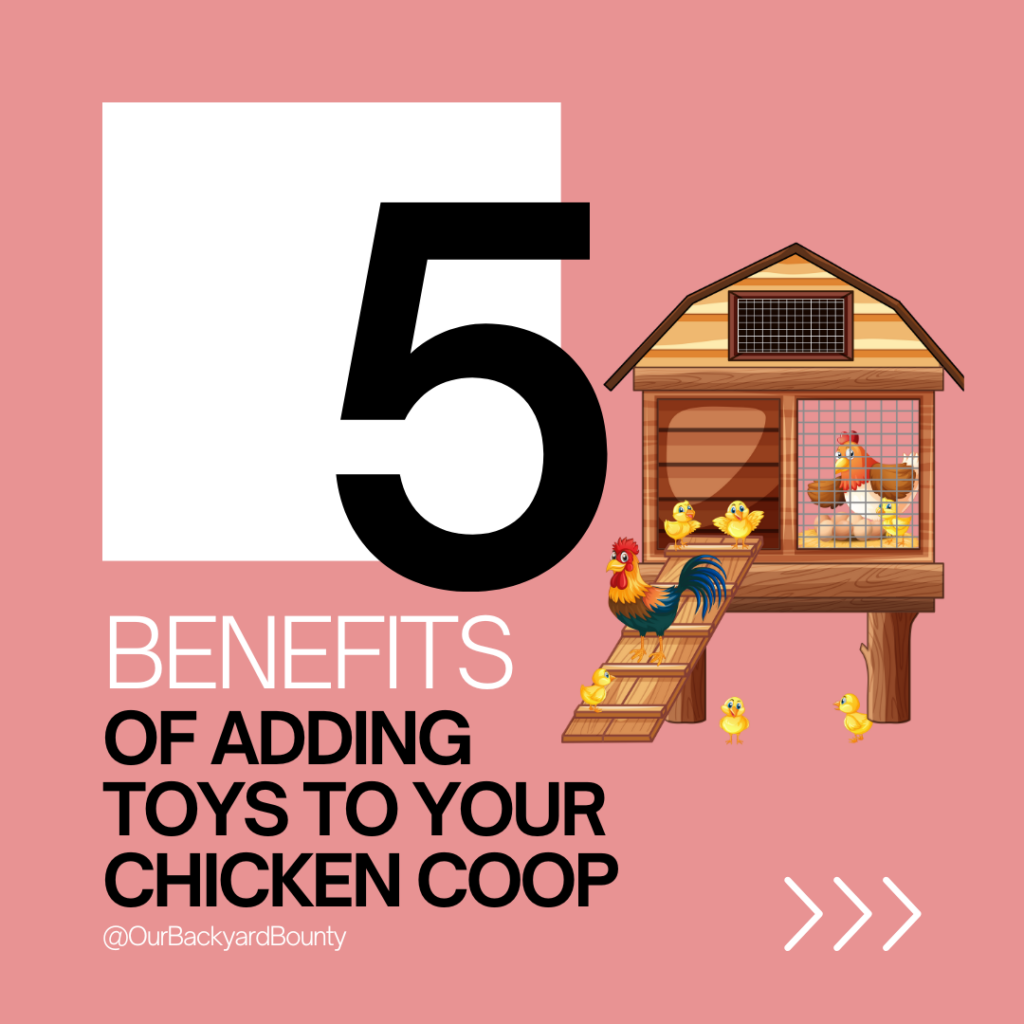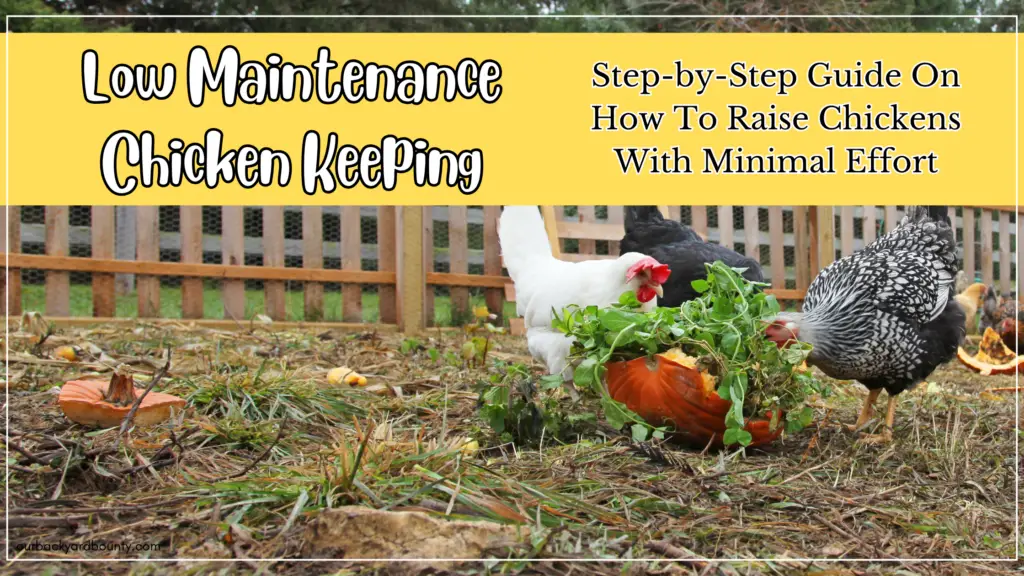This post is all about can chickens eat grapes?

Can Chickens Eat Grapes?
Chicken keepers are always looking for treats they can share with their flock. It’s a common misconception that chickens are like feathered garbage disposals that can eat anything. There’s many things that shouldn’t be fed to chickens, because it could be detrimental to their health. But can chickens eat grapes? The short answer…yes. Grapes are safe for chickens to eat!
As a means for providing for my family, I may earn commissions if you shop through the links on this page at no additional cost to you. Thank you!
How Many Grapes Can Chickens Eat?
Chickens love munching on delicious grapes as an occasional snack. But keep in mind, that 90% of a chickens diet should consist of nutritious feed.
Their treat intake, including fruits like grapes, should only account for about 10% of their daily diet to ensure they receive the proper balance of vitamins, minerals, and proteins. Overfeeding treats can lead to nutritional imbalances and health issues, so it’s best to offer grapes and other treats in moderation.
Keep in mind that grapes are high in sugar, so you should limit them to only 1-2 times a week, and opt for other treat options on the other days.
Always make sure any fruits or snacks are chopped into small, manageable pieces to prevent choking and ensure your flock stays happy and healthy.

Health Benefits Of Grapes For Chickens
Not only are grapes a safe treat choice for chickens, but they even offer some health benefits to your flock!
Grapes contain several nutrients including Vitamins A and C, along with the B-complex vitamins, and essential trace elements like copper and calcium.
Why are those nutrients beneficial to your chickens?
- Vitamin A: Imperative for vision health, proper growth, and strong bone-development.
- Vitamin C: Enhances stress response, boosts disease resistance, and combats free radical damage. Additionally, it improves egg production and hatch rates.
- Vitamin B Complex: Beneficial to the immune system, metabolism and nervous system. It’s also good for a chicken’s feathers, skin, and egg production.
- Copper: Supports healthy growth and a strong immune system, and helps combat bacterial overgrowth.
- Zinc: Essential for metabolism, immune function, and reproductive health.
Can Chickens Eat Moldy Grapes?
No! Never feed chickens moldy grapes, or any other moldy food for that matter. Moldy food can harbor harmful bacteria and fungal toxins (mycotoxins) that pose a serious risk to chickens’ health and can be fatal.

Potential Risks of Feeding Grapes to Chickens
While grapes are safe to feed chickens, feeding chickens grapes can also pose several risks if not done properly. Here are some potential risks to consider:
- Choking Hazard: Grapes are small and can be a choking hazard if not cut into smaller pieces. Whole grapes can be difficult for chickens to chew and may pose a risk of choking.
- High Sugar Content: Grapes have a high natural sugar content, which can contribute to obesity and related health issues if fed in excess. Excessive sugar can also lead to digestive problems and potentially disrupt the balance of their diet.
- Imbalanced Diet: Grapes should only be a small part of a chicken’s diet. Overfeeding fruits can lead to nutritional imbalances and deficiencies if they displace more nutritious feed.
- Potential for Pesticides: Grapes, like many fruits, may have pesticide residues on them. It’s important to wash grapes thoroughly or choose organic ones to avoid exposing chickens to harmful chemicals.
- Digestive Issues: Too many grapes can cause digestive upset, such as diarrhea, due to their high water content and sugar. It’s important to feed grapes in moderation to prevent these issues.
- Fungal Contamination: Moldy or spoiled grapes can contain harmful fungal toxins (mycotoxins) that can be toxic to chickens. Always ensure grapes are fresh and free from mold before offering them to your flock.
- Behavioral Issues: If chickens become accustomed to receiving grapes frequently, they may start to refuse their regular feed or become overly demanding for treats, leading to behavioral issues.
By being mindful of these risks and feeding grapes in moderation, you can safely include them as an occasional treat in your chickens’ diet.
How to Safely Feed Grapes to Chickens
Feeding grapes to chickens can be a healthy treat when done properly. Here are some guidelines to ensure you’re offering grapes safely and in a way that benefits your flock:
- Wash Thoroughly: Always wash grapes thoroughly before feeding them to your chickens. This helps remove any pesticide residues or contaminants that might be present on the fruit.
- Cut Into Small Pieces: Grapes should be cut into small, manageable pieces to prevent choking. Slicing grapes into quarters or smaller pieces is recommended, especially for younger or smaller chickens.
- Limit the Quantity: Grapes should only be an occasional treat and not a regular part of your chickens’ diet. Limit their intake to a small handful of pieces per chicken. Treats, including grapes, should make up no more than 10% of their daily diet to ensure they get a balanced nutrition from their primary feed.
- Monitor for Reactions: Keep an eye on your chickens after introducing grapes to their diet. Look out for any signs of digestive upset or allergic reactions, such as changes in droppings or unusual behavior. If you notice any issues, reduce the amount or frequency of grapes given.
- Avoid Moldy or Spoiled Grapes: Never feed moldy or spoiled grapes to your chickens, as they can contain harmful mycotoxins that are dangerous to poultry health. Always ensure the grapes you offer are fresh and in good condition.
My favorite way to feed any treats to my chickens is with my ADORABLE Chick-Nic Table! How cute is this?
- 【Chicken Feeders and Waterers】- This set includes chicken picnic table and 2pcs chicken waterer. Get this chicken feeder kit will allow your chickens, ducks and other poultry to enjoy a good meal while still having clean water. A must have for your chicken coop

By following these guidelines, you can safely include grapes in your chickens’ diet and provide them with a tasty, nutritious treat that they’ll enjoy.
Alternatives to Grapes
If you’re looking to diversify your chickens’ treat options beyond grapes, there are plenty of healthy and enjoyable alternatives to consider. Here are some nutritious fruits and treats that can be a great addition to your flock’s diet:
- Berries: Blueberries, strawberries, raspberries, and blackberries are excellent choices. They are packed with vitamins, antioxidants, and are generally low in sugar. Serve them fresh or frozen, and cut them into smaller pieces if needed.
- Apples: Apples are a good source of vitamins A and C, and fiber. Be sure to remove the seeds and core before offering them to your chickens, as apple seeds contain cyanogenic compounds that can be harmful.
- Bananas: Bananas are rich in potassium and vitamins. They are also soft and easy for chickens to eat. Serve them in small slices to avoid overfeeding.
- Melons: Watermelon, cantaloupe, and honeydew are hydrating fruits that can be a refreshing treat. They are high in water content, so offer them in moderation to prevent digestive issues.
- Pumpkin: Pumpkin is a nutritious option high in vitamins A and C, and it’s also good for digestive health. Offer it cooked or raw, and consider providing the seeds as well for added benefits.
- Carrots: Carrots are rich in vitamins and can be a crunchy, healthy snack. Slice or grate them to make it easier for chickens to eat.
- Leafy Greens: Spinach, kale, and lettuce are great for providing essential vitamins and minerals. They can be fed fresh and are a healthy supplement to their regular feed.
- Corn: Fresh or cooked corn can be a tasty treat that chickens enjoy. It’s also a good source of carbohydrates and energy.
- 7-Grain Ultimate Chicken Scratch Treats: Your chickens will go crazy over these chicken treats! Contains Corn, wheat, milo, barley, oats, sunflower seed, millet. As with any treat, it shouldn’t make up more than 10% of their daily diet.
Tip:
When introducing new treats, always do so gradually and in moderation to ensure your chickens’ digestive systems adjust smoothly. Mixing up their treat options not only keeps them entertained but also helps provide a variety of nutrients to support their overall health.

Conclusion:
Incorporating grapes into your chickens’ diet can be a delightful and nutritious treat when done correctly. By understanding the potential risks and adhering to safe feeding practices, you can ensure that grapes add value to your flock’s diet without causing harm. Remember to always wash and cut grapes into small pieces, limit their quantity to prevent nutritional imbalances, and be mindful of any signs of digestive issues or adverse reactions.
While grapes are a tasty option, there are plenty of other healthy treats available that can also enrich your chickens’ diet. From berries and apples to leafy greens and carrots, offering a variety of fruits and vegetables can provide essential nutrients and keep your chickens happy and healthy.
Maintaining a balanced diet with quality feed as the primary component, and providing occasional treats like grapes, ensures your flock thrives. By following these guidelines, you’ll be well on your way to keeping your chickens in optimal health and offering them a range of enjoyable, nutritious snacks.
Now That We’ve Answered The Question: Can Chickens Eat Grapes? Check out some additional chicken resources below!
10 Herbs To Plant Around Your Chicken Coop – & Why!
This post is all about what herbs to plant around your chicken coop. Best Herbs…
How To Keep Chickens Cool In The Summer Heat – 10 Game Changing Hacks
This post is all about how to keep chickens cool in the summer. Ways To…
10 Best Predator Proof Chicken Coop Essentials
This post is all about predator proof chicken coop essentials. Predator Proof Chicken Coop Essentials…
Ultimate Chicken First Aid Kit: What You Need For A Healthy Flock
This post is all about what to include in a chicken first aid kit. Every…
Low Maintenance Backyard Chicken Keeping – So It Doesn’t Take Over Your Life
This post is all about low maintenance backyard chicken keeping. Raising chickens in your backyard…
Gardening With Kids – How To Get Them Involved (And Excited!)
This post is all about gardening with kids. Gardening With Kids Gardening with kids is…








